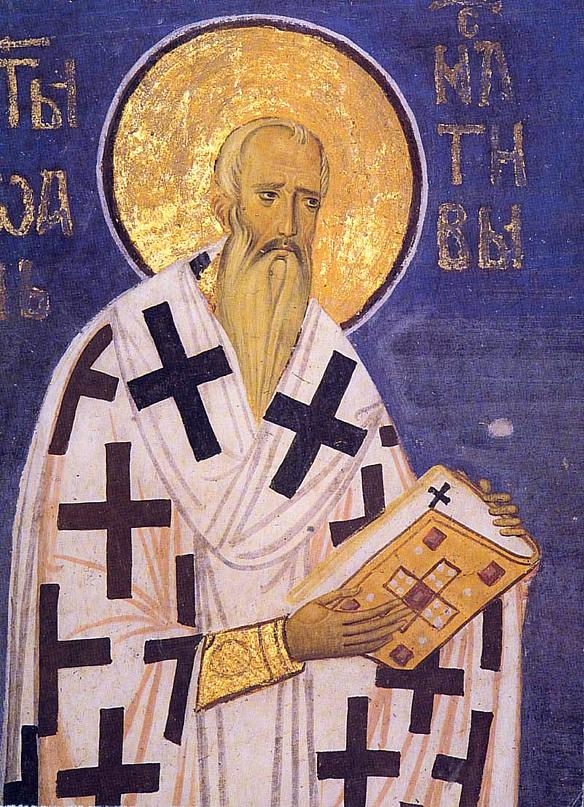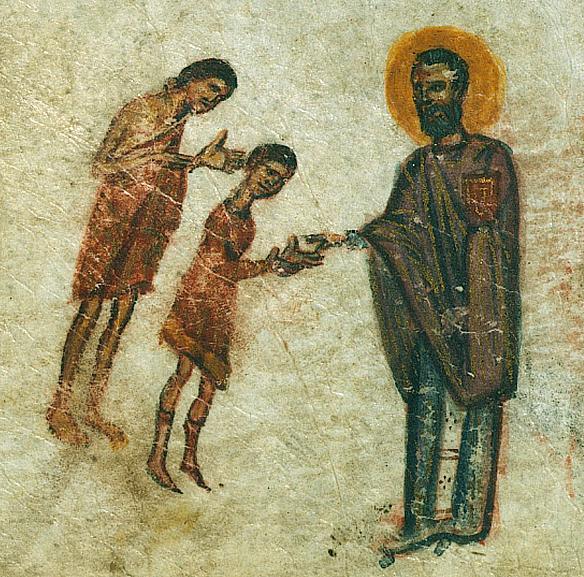Saint John the Alms-Giver
12 Νοεμβρίου 2017
John was born on the island of Cyprus. His father was the eparch, a man of renown, called Epifanios. John was brought up from childhood as a real Christian and, against his will, but because his parents insisted, he married and had children. By God’s providence, his wife and children all departed this life early. John quickly became well-known for his great compassion, with the result that, in the reign of Irakleios, he was elected Patriarch of Alexandria (610). He governed the Church of Alexandria soundly for a decade, as a true shepherd, protecting it from dangers on the part of pagans and heretics. Once, when he was speaking to his flock, Saint John said: “If you wish to be noble, don’t go looking for it in blood, but in the virtues, because that is true nobility”.

Saint John the Alms-Giver. Fresco from Studenica Monastery, 1209
All the saints are distinguished for their mercy, but the holy Patriarch of Alexandria was dedicated to the wonderful virtue of alms-giving; hence his name. Once, when he was celebrating the Divine Liturgy, he recollected the words of Christ: “So if you are offering your gift at the altar and there remember that your brother has something against you, leave your gift there before the altar and go. First be reconciled to your brother, and then come and offer your gift” (Matth 5, 23-4). He remembered that a clergyman in that church held something against him, so he immediately left the Precious Gifts, approached the priest and fell at his feet. He begged his forgiveness and only after they had been reconciled did he return to the Holy Altar.

Saint John the Alms-Giver. Icon from Monastery Dionysiou, Holy Mountain, 1577
On another occasion, while he was en route to the church of the Holy Unmercenary Doctors, Kyros and Ioannis, he met a widow woman who was impoverished and destitute, who began to tell him her troubles at great length. The people accompanying him grew tired of listening to this litany of woes from the woman and urged him to hurry on to the church, for the service. They said he could listen to woman’s story later. But John said: “And how will God listen to me, if I don’t listen to her?”. The saint refused to budge until the poor woman told him the whole of her story.
When the Persians attacked Egypt, Patriarch John embarked on a ship to escape the danger. During the voyage, he fell ill and, when they reached Cyprus, he departed this life, in the year 620, in his place of birth (Amathus), where he was buried. After his departure for the Incorrupt Kingdom of the Lord, his wonder-working and grace-bestowing relics were taken to Constantinople, thence to Budapest and finally to Pressburg [i.e. Bratislava].
Source: Saint Nikolaï Velimirović, The Ochrid Prologue, November.
At first sight, it seems unlikely that Saint John would have been elected to the enormously wealthy and important Patriarchate of Alexandria simply because the people there had heard of his reputation as an alms-giver in Cyprus. Perhaps a clue to the real reason is in his exhortation to seek “nobility” in virtue, rather than blood. He came from a very distinguished family – hence the insistence that he marry and provide an heir. Even as the monk he later became, he would have remained a member of the ruling class of the day. He was a mature man, in his fifties, when his friend Nikitas, the governor of the city of Alexandria, proposed him as a suitable candidate to fill the vacant see. There would have been no lack of other contenders, so John must have been outstanding.

Saint John the Alms-Giver. Byzantine Psalter, 14th Century
Another point of interest is the story of the destitute woman. The people who were with Saint John would have been his Patriarchal entourage: the dean, senior clergy, perhaps a bishop or two. That they felt able to remonstrate with him is an indication of his mild character; and that he made them wait in any case an indication of his firmness.
His relics were taken to Venice where there is a church, San Giovanni Elemosinario, dedicated to him (it bears a rather striking resemblance, in its bizarre exterior, to the church of Saint Minas in Thessaloniki). Apart from the relic sent by Sultan Bayezid II to King Matthias Corvinus of Hungary in 1489 (as Saint Nikolaï mentions), other parts of his body are at rest in Saint Martin’s Cathedral, in Bratislava, where there is a chapel dedicated to him. (WJL)



